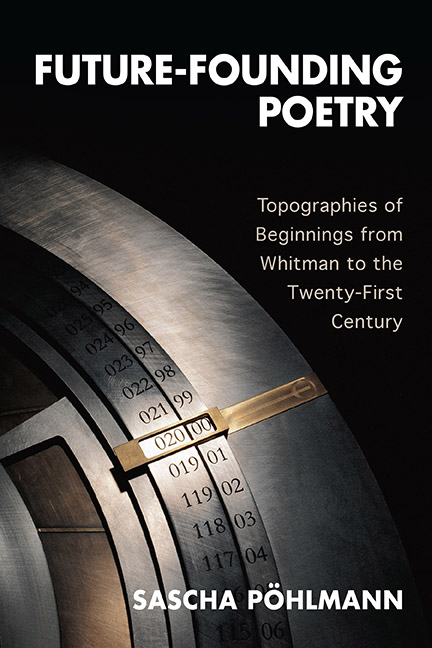Book contents
- Frontmatter
- Contents
- Acknowledgments
- Introduction: On How to Begin, and Where
- 1 Whitman: Beginning American Poetry
- 2 Williams: Beginning Again
- 3 Hughes: Urgent Beginnings
- 4 Rukeyser: Communal Beginnings
- 5 Ginsberg: Defiant Beginnings
- 6 Future-Founding Poetry after 9/11
- Conclusion: On Where to End
- Notes
- Works Cited
- Index
2 - Williams: Beginning Again
Published online by Cambridge University Press: 25 May 2021
- Frontmatter
- Contents
- Acknowledgments
- Introduction: On How to Begin, and Where
- 1 Whitman: Beginning American Poetry
- 2 Williams: Beginning Again
- 3 Hughes: Urgent Beginnings
- 4 Rukeyser: Communal Beginnings
- 5 Ginsberg: Defiant Beginnings
- 6 Future-Founding Poetry after 9/11
- Conclusion: On Where to End
- Notes
- Works Cited
- Index
Summary
What time is it? Time / to begin again!
—William Carlos Williams, “The Tailpiece”BUT HOW CAN ONE BEGIN AFTER WHITMAN? Even though the futurefounding imagination that finds expression so strongly in his work seems to be geared toward producing conditions of possibility, it may in fact be more stifling than enabling for those “poets to come,” and from their perspective, Whitman's beginnings risk preventing rather than cultivating other beginnings. Whitman's future-founding poetics might be seen as too rigid a framework, a model in the negative sense of an original that can merely be copied—an origin after all despite its insistence on being a beginning. One could argue that Whitman appropriates the very concept of beginning to such an extent that he monopolizes it, and that anyone striving to begin will have to begin Whitman's way, or with reference to him, no matter if positively or negatively. Even with a conception of beginnings that demands no originality, such beginnings seem all too derivative and repetitive, and the future founded in such a way would consist merely of a circular sameness in which all beginnings are iterated with reference to a single original beginning and thus fail to provide any future-founding energy themselves. Envisioned in such a way, “beginning after Whitman” thus takes on a double meaning that comprises the dilemma of poets that attempt to do so: it is a temporal statement but also one of influence, in the sense of writing “after Whitman's fashion,” and thus it points toward two problematic aspects that need to be addressed by the prospective beginner.
Undoubtedly, it was especially the modernist poets who, in their own preoccupation with beginnings, needed to solve this paradoxical problem of beginning where somebody else had already begun so forcefully, and they responded with strategies that are as different as their poetry. Some chose to (paradoxically) follow Whitman's own strategy of the clean slate and pretend he never wrote anything, rejecting Whitman as a foundation for the poetic future they envision; I consider T. S. Eliot's poetry the prime example of this rejection. Others, such as Ezra Pound, engaged the problem directly, and this is what his “A Pact” (with Whitman) is about.
- Type
- Chapter
- Information
- Future-Founding PoetryTopographies of Beginnings from Whitman to the Twenty-First Century, pp. 104 - 156Publisher: Boydell & BrewerPrint publication year: 2015

